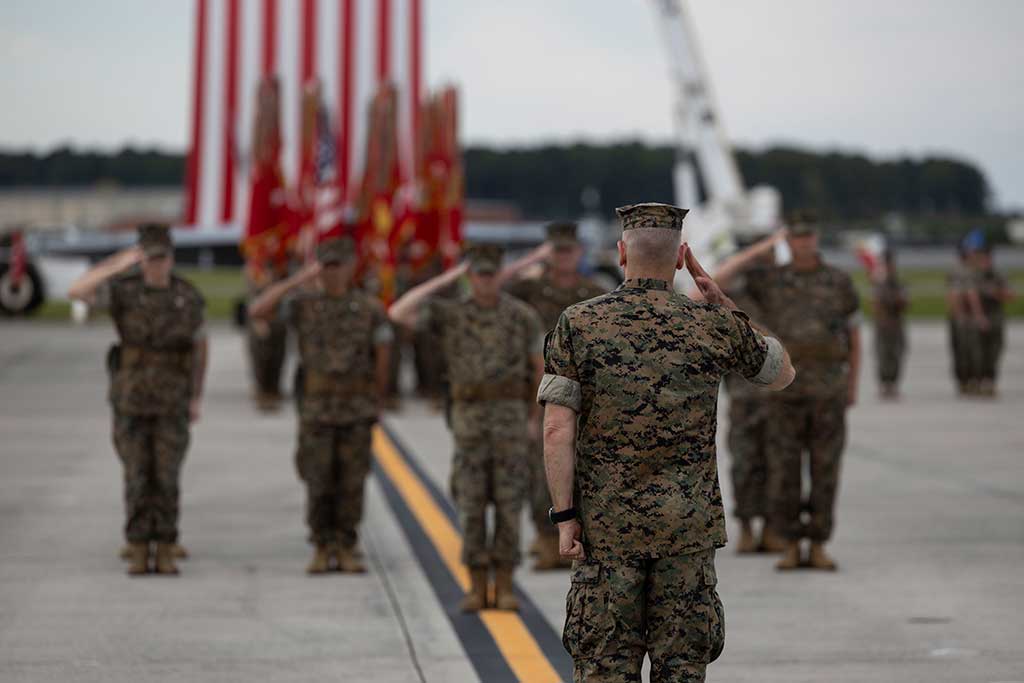To Be Inspired

What does it mean to be inspired? We needn’t engage in etymological studies or comparative analysis, since these simply complicate a search for meaning that is readily available. To be inspired is to be motivated to acts of healthy emulation of that which one sees as humanly good. Whether someone can articulate it to himself or not, we naturally wish to grow as human beings. On this point, the desire to grow as a human being can be clarified by philosophical inquiry, but it isn’t really necessary for our purpose here because we have the tradition of the Marine Corps from which we can draw examples of honor, courage, commitment, intellectual and practical proficiency, and self-direction that can induce people to emulate these examples in pursuit of self-improvement. This is what is meant by being inspired.
In any kind of human endeavor, regardless of the skills involved, the activities are sharpened and made more effective by the level of personal growth achieved by the practitioner. We can imagine activities like playing horse shoes or skipping rocks on water that people can do, and do well, without having to attend to activities of personal growth and development, but this is clearly not true in the matter of living a human life. We have remarked here before that no matter what one devotes his life to doing, whether being a spouse, a parent, a teacher, a builder, a Marine, we are human beings first, and the sort of human being one is, and one becomes, matters to what a person does with his life. The Marine Corps well understands that in the wide array of skills Marines bring to bear in accomplishing a mission, at bottom is a human being whose proficiency at thinking and acting like a well-formed human being is essential to excellence in the execution of tasks. Here again, we can seek a definition of excellence, but when one sees it in action, it is obvious. Hence the Marine leadership principle of setting the example of excellence for others. The Marine Corps University describes this principle of setting the example for others in part by saying that a Marine leader has the duty of setting the example for other Marines by personal example. This, of course, implies being able to do what a leader asks others to do, to be physically fit, well groomed, and properly dressed. A leader setting an example for others should have personal qualities that inspire others to emulate them, like optimism, calmness, and confidence, and of course, a leader should behave in such a way that his personal habits are not open to criticism. Here we can see the importance of personal growth as a human being to the skill of being a leader.

A leader should delegate authority and should resist the temptation of “over-supervision,” thus inspiring in others the desire to develop as leaders. This requires the somewhat “off-stage” practice that is the substance of the first Marine leadership principle to know oneself and to seek self-improvement. This demands first of all the honesty that is an important element of honor in order to evaluate oneself and determine one’s strengths and weaknesses. It is this determination of one’s strengths and weaknesses that sets one’s personal agenda for self-improvement, and this practice, undertaken as a way of life, others will see as something truly genuine and truly worthy of emulation. This finds expression in the skillful use of one’s strengths while working to improve one’s weaknesses. In fact, this practice re-enforces itself since as someone learns ever better to use his strengths, he notices it in himself, and the same is true with improving one’s weaknesses. Interestingly, and importantly, on this principle of leadership, the Marine Corps University urges leaders to “Master the art of effective writing and speech.” A number of scholars have observed, like the late Richard M. Weaver in his book The Ethics of Rhetoric, that the more technologies of communication proliferate, the worse seems to be the quality of communication. A leader must be able to communicate clearly and effectively, and it takes no great effort to see that this ability in someone inspires others to emulate it.
Thus far we have considered a few of the practices by which one can become a leader of the sort who can inspire others to do likewise, but the traits of a leader, as the Marine Corps understands them, are immediately visible to others and so naturally tend toward inspiring others. A trait that is immediately obvious is bearing, which is said to be creating a favorable impression in others by the way in which one carries himself, and in appearance and personal conduct. When talking about the personal traits of a leader, it is evident that not everyone can reach the same level of performance, but where there are standards of excellence and they are actively pursued, everyone improves, everyone benefits, and the mission, whatever it is, is well served.
Courage is a quality that has exercised thinkers in the West for a few millennia. What is it? Among the traits of a Marine leader, we find this definition: “The mental quality that recognizes fear of danger or criticism, but enables a man to proceed in the face of it with calmness and firmness.” This is a quality that evinces in others a kind of inspiration that is really admiration, and also the sort of inspiration we are advocating here, the desire to become like the one who is courageous, and to act courageously wherever one functions. As with so many of the challenges one may undertake that require focus, effort, and constancy, one must be dependable, and this is certainly true in enterprises that have people working and cooperating together. If dependability is the certainty in the minds of others of the proper performance of one’s duty, it is clear that such people are indispensable to any mission that presents obstacles to achievement.
Decisiveness is a leadership trait that can inspire in others the desire to develop this quality in themselves. The ability to take decisions quickly and to announce them clearly and forcefully calls into service the leadership principle of being technically and tactically proficient. It is eminently more likely that someone who can act quickly will act on the basis of prudent decisions if he knows what he is doing because he knows his profession well. Among the traits of a Marine leader that are taken by the general public to be integral to Marines is endurance, or the “mental and physical stamina measured by the ability to withstand pain, fatigue, stress and hardship.” It is through endurance that someone is able to persevere and to adapt to difficult and changing circumstances in the determined accomplishment of a mission.
In this brief discussion, we can see that the examples of Marines displaying the bearing of a leader in missions requiring courage, decisiveness, dependability, and endurance are examples of well-formed, well-developed human beings whose conduct evinces in others the desire to possess those qualities, and in this, to be inspired.


